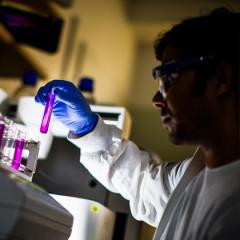A breakthrough in sustainable solar energy is moving closer to market, thanks to a new partnership between The University of Queensland (UQ) and clean technology company Halocell Energy.
Australian Institute for Bioengineering and Nanotechnology (AIBN) researcher Dr Peng Chen has secured almost $200,000 through the latest Australia’s Economic Accelerator Ignite funding round to accelerate the commercial production of tin-based perovskite solar panels.
Over the past decade, perovskite solar cells have transformed the solar industry by offering a more cost-effective option to traditional silicon panels, with manufacturing costs up to one-third lower. Despite this, widespread use has been hindered by potential environmental concerns around the use of heavy metal lead.

To address this, Dr Chen and his team - including UQ’s Professor Lianzhou Wang and AIBN’s Dr Dongxu He – have replaced the lead with tin, recently setting a world-record efficiency for lead-free perovskite solar cells.
Now, with industry entrepreneur Paul Moonie and Dr Ngoc Duy (David) Pham from Halocell Energy on board, the project is entering a new phase and scaling up for real world use in lead-free solar panels.
“There is a huge demand for solar cells that are cost-effective and efficient to manufacture, but also eco-friendly,” Dr Chen said.
“By replacing the heavy metal lead with lightweight tin, we can deliver comparable efficiency and sustainable solar power technology.
The funding boost will enable the team to move beyond lab-based prototypes and to real-world testing.
“Our prototypes have already shown strong results in the lab, scoring a world record for a certified efficiency of 16.65%, and now the next step is to prove their performance outside these controlled conditions,” Dr Chen said.
“Over the next 12 months, we will be testing a range of applications outside the lab, and in both indoor and outdoor environments.
“The next phase will see our solar panels integrated with wireless home appliances, unmanned drones and wearable electronics.”

Paul Moonie from Halocell Energy expressed enthusiasm to be partnering with AIBN to help transition the research from the lab to commercially viable products.
“We’re thrilled to be part of this project and to help fast-track the transition from cutting-edge research to real-world applications,” Mr Moonie said.
“This initiative will help create the first generation of lead-free perovskite solar panels, unlocking a multi-million-dollar market in indoor solar cells, portable electronics and smart home applications.
“We love working with the team at AIBN - their world-class expertise and shared commitment to sustainable innovation make them the ideal partner for this venture.”
A breakthrough in sustainable solar energy is moving closer to market, thanks to a new partnership between The University of Queensland (UQ) and clean technology company Halocell Energy.
Australian Institute for Bioengineering and Nanotechnology (AIBN) researcher Dr Peng Chen has secured almost $200,000 through the latest Australia’s Economic Accelerator Ignite funding round to accelerate the commercial production of tin-based perovskite solar panels.
Over the past decade, perovskite solar cells have transformed the solar industry by offering a more cost-effective option to traditional silicon panels, with manufacturing costs up to one-third lower. Despite this, widespread use has been hindered by
potential environmental concerns around the use of heavy metal lead.
To address this, Dr Chen and his team - including UQ’s Professor Lianzhou Wang and AIBN’s Dr Dongxu He – have replaced the lead with tin, recently setting a world-record efficiency for lead-free perovskite solar cells.
Now, with industry entrepreneur Paul Moonie and Dr Ngoc Duy (David) Pham from Halocell Energy on board, the project is entering a new phase and scaling up for real world use in lead-free solar panels.
Join The Network
Stay on top of our industry news and developments, events and opportunities, by joining The Network
“By replacing the heavy metal lead with lightweight tin, we can deliver comparable efficiency and sustainable solar power technology.
The funding boost will enable the team to move beyond lab-based prototypes and to real-world testing.
“Our prototypes have already shown strong results in the lab, scoring a world record for a certified efficiency of 16.65%, and now the next step is to prove their performance outside these controlled conditions,” Dr Chen said.
“Over the next 12 months, we will be testing a range of applications outside the lab, and in both indoor and outdoor environments.
“The next phase will see our solar panels integrated with wireless home appliances, unmanned drones and wearable electronics.”
Paul Moonie from Halocell Energy expressed enthusiasm to be partnering with AIBN to help transition the research from the lab to commercially viable products.
“We’re thrilled to be part of this project and to help fast-track the transition from cutting-edge research to real-world applications,” Mr Moonie said.
“This initiative will help create the first generation of lead-free perovskite solar panels, unlocking a multi-million-dollar market in indoor solar cells, portable electronics and smart home applications.
“We love working with the team at AIBN - their world-class expertise and shared commitment to sustainable innovation make them the ideal partner for this venture.”
Want to learn more about this story or how you can partner with AIBN on ground-breaking research?
Contact us via email: communications@aibn.uq.edu.au
or phone: +61 414 984 324


